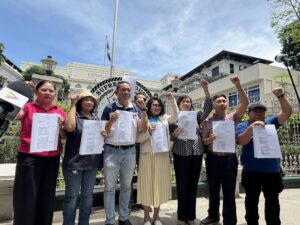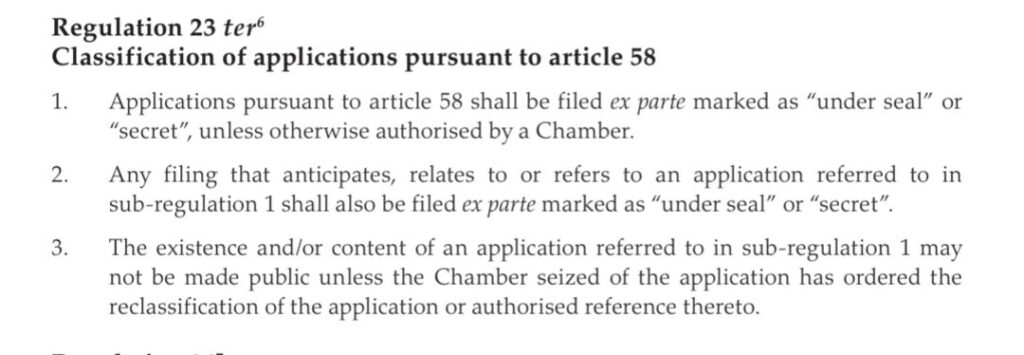📷: National Union of Peoples’ Lawyers | FB
Makabayan party-list representatives and mass leaders filed a Joint Motion for Reconsideration before the Supreme Court, urging it to reverse its July 25, 2025 Decision that declared the impeachment proceedings against Vice President Sara Z. Duterte unconstitutional.
Incumbent ACT Teachers Party-List Rep. Antonio Tinio and Kabataan Party-List Rep. Renee Co—together with Makabayan President Liza Maza, Bagong Alyansang Makabayan (Bayan) Chairperson Teodoro Casiño, Bayan President Renato Reyes, Piston President Modesto Floranda, and Sandugo convenor Amirah Lidasan—who were among the filers of the second impeachment complaint, filed a motion to intervene along with their Joint Motion for Reconsideration. Joining them as intervenors are former ACT Teachers Party-List Rep. France Castro, Gabriela Women’s Party Rep. Arlene Brosas, and Kabataan Party-List Rep. Raoul Danniel Manuel, who endorsed the second impeachment complaint.
The group is represented by the National Union of Peoples’ Lawyers (NUPL) as counsel.
“The framers of the 1987 Constitution intended impeachment to be a politically accessible tool of accountability, not a constitutional remedy encumbered by procedural obstacles. The Supreme Court’s ruling narrows the very pathway that the Constitution deliberately kept open,” said NUPL Secretary General Atty. Josalee S. Deinla.
“The Constitution makes clear: if one-third of all House members sign a verified impeachment complaint, it constitutes the Articles of Impeachment and trial must forthwith proceed at the Senate. With all due respect, the Supreme Court’s additional requirements have no basis in the text and undermine the separation of powers.”
“The intervenors are gravely concerned that, if left standing, the Decision could render impeachment as an ‘exceptional power of oversight’ powerless and out of reach. They urge the Supreme Court to apply the Constitution as it is written, without overriding the meaning it gives itself. In a democracy, the path to accountability must remain open,” Deinla said.
The intervenors submit the following key arguments in their Joint Motion:
- There is no grave abuse of discretion on the part of the House of Representatives.
The House of Representatives is presumed to have acted regularly and in good faith—a presumption that petitioners failed to rebut with any contradictory evidence. The record shows that the first three impeachment complaints were placed in the Order of Business within the constitutionally mandated ten-session-day period and were transmitted to the Archives only after the fourth complaint—endorsed by more than one-third of all House members—had been sent to the Senate. On these facts, the House acted within constitutional timelines and procedures, in a manner that cannot be characterized as neglect, much less grave abuse of discretion.
- The Articles of Impeachment were not barred by the one-year ban.
Under Francisco v. House of Representatives, the one-year bar applies only after an impeachment complaint has been both filed and referred to the Committee on Justice—a step never reached by the first three complaints. The Court’s new rule, which counts mere inaction or partial action as “initiation,” imposes a limit absent from the Constitution and runs the risk of reducing impeachment to a race to file first, a danger that the Court itself warned against in Gutierrez v. House of Representatives.
On February 5, 2025, as House Journal No. 36 records, all four complaints were read into the record. The House endorsed the fourth complaint signed by more than one-third of its members, to the Senate under Section 3(4), Article XI. Only afterward were the earlier three complaints archived.
The fourth impeachment complaint was validly acted upon by the House, and in doing so, it effectively foreclosed the initiation of the first three complaints. This action, taken in open session and without objection, reflected the plenary exercise of the House’s constitutional authority and the collective political judgment of more than one-third of its members.
- There is no precedence between the two modes of initiating impeachment; discretion which complaint to endorse to the Senate rests exclusively with the House.
The Constitution grants the House exclusive authority to initiate impeachment, whether through a citizen-filed complaint under Section 3(2) or a verified complaint by one-third of its members under Section 3(4). Both modes are co-equal. The Decision, however, curtails this prerogative by deeming a complaint “dismissed” if only partially acted upon, even without referral to the Committee on Justice—an interpretation that departs from Francisco and Gutierrez, which affirm that initiation rests solely with the House.
By endorsing the fourth complaint and archiving the first three, the House acted through plenary motion, in open session, and with the support of a constitutionally sufficient bloc. This was a valid exercise of its constitutional discretion, no less deliberative than committee review, and fully consistent with the framers’ intent to keep impeachment accessible even in adverse political conditions.
- Due process guarantees do not apply at the initiation stage of an impeachment under Section 3(4), Article XI of the Constitution.
The Constitution clearly provides that when a verified complaint is filed by at least one-third of all House members, it automatically constitutes the Articles of Impeachment and trial in the Senate must forthwith proceed. The additional requirements under the Decision—such as furnishing the respondent with the draft Articles and giving an opportunity to respond before transmittal—have no basis in the text and amount to an amendment of constitutional procedure.
Due process under Article III is triggered only when life, liberty, or property is at stake. Public office, held in trust for the people, is not a vested private right. At the initiation stage, no penalty is imposed as the process merely sets a Senate trial in motion, where the respondent will have full opportunity to defend herself. Imposing trial-type safeguards before this point misapplies the Bill of Rights, distorts the constitutional design of impeachment, and undermines the House’s exclusive prerogative to initiate proceedings under Article XI.
The Joint Motion for Reconsideration prays that the Supreme Court dismiss the consolidated petitions and affirm the validity of the transmittal of the Articles of Impeachment to the Senate so that trial may proceed forthwith. ###




